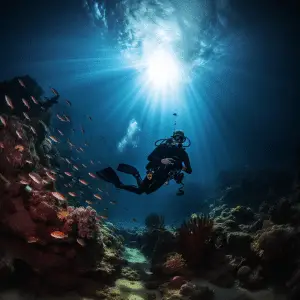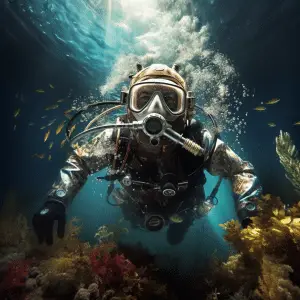Scuba diving? A thrilling and breathtaking adventure! But, risks come with the beauty and mystery of the underwater world. Understanding these risks can help divers take precautions and make their dive safer.
Depths bring pressure. As divers descend, the pressure increases, leading to barotrauma. This can affect lungs, sinuses and teeth. Equalizing ears and following proper descent techniques can prevent this.
Decompression sickness, or ‘the bends’, is caused by nitrogen gas absorption when divers stay at depths for too long. Ascending too quickly without allowing the gas to dissipate can lead to joint pain, dizziness and paralysis. Managing dive times and following decompression schedules can minimize this risk.
Equipment failure is a potential disaster. Malfunctioning regulators and loose mask straps can be avoided with regular maintenance checks and proper training. Having a reliable buddy to assist in emergencies is essential.
Safety measures ensure a safe scuba diving experience:
- Obtaining certifications builds skills and knowledge for responsible diving practices.
- Planning dives carefully considers currents, visibility, weather and depth limits.
- Pre-dive checks examine equipment functionality.
- Investing in good quality gear from reputable brands.
- Practicing buoyancy control skills protects marine ecosystems.
By understanding the risks and taking safety measures, divers can explore the underwater world while minimizing danger. Dive responsibly and attentively for an unforgettable experience!
The Thrill of Scuba Diving

The thrill of scuba diving is in exploring a new world under the waves. It’s a break from everyday life, a chance to experience something unknown and a sense of freedom.
- Scuba diving lets you explore an incredible underwater environment full of life. From shimmering coral reefs to mysterious marine creatures, each dive is a breathtaking adventure!
- Scuba diving has an adrenaline rush like no other sport. Gliding in the water, hearing your own heartbeat and the anticipation of something extraordinary creates an unimaginable excitement.
- Scuba diving also provides an opportunity for personal growth and self-discovery. Overcoming challenges increases confidence, builds resilience and deepens understanding of yourself. It’s both physically and mentally demanding.
Furthermore, scuba diving contributes to conservation by raising awareness about ocean fragility and inspiring people to protect it.
Diving Risks: It’s like diving into the unknown with a blindfold on, hoping there’s no irony-loving sharks!
Diving Risks
Scuba diving is an exciting and daring activity that lets people explore the ocean’s hidden depths. But, one needs to be aware of the risks that come with this underwater sport.
Decompression sickness, also known as ‘the bends’, is a primary danger. This happens when nitrogen bubbles form in the bloodstream due to a quick rise from deep waters. Symptoms can vary from joint pain to numbness – and can even be deadly if not treated quickly.
Equipment failure is another potential danger. Faulty regulators or dive masks can lead to a lack of air or bad vision, risking the safety of the diver. Regularly checking and maintaining gear can help reduce this hazard.
Wildlife encounters can also be a threat. Most marine life is harmless, but if you disturb them or accidentally touch them, they can become defensive and cause harm.
Murky water is another major issue for divers. Poor visibility can hide obstacles and disorientate people underwater, raising the chance of injuries or accidents. Staying alert and using the right lighting techniques are key to avoiding this danger.
Finally, bad weather can make diving hazardous. Strong currents or storms can push divers away or make it hard to get back to the surface. Keeping an eye on the forecast and being wise by putting off dives during rough conditions is highly recommended.
Pro Tip: Before heading into the deep blue, you must get proper training and certification from a recognised diving organisation. This way you learn the skills and knowledge needed to keep risks low and have a safe time exploring the ocean’s wonders.
Safety Measures and Precautions
Scuba diving can be dangerous if not done correctly. To stay safe underwater, follow this 6-step guide:
- Equipment Check: Inspect your gear before diving. Look for leaks in tanks, check regulator and buoyancy control device.
- Dive Planning: Plan dives carefully and use the buddy system. Talk about dive depth, time limits, hand signals with dive partner.
- Proper Training: Get training and certification from a reputable diving organization. This will give you the skills to handle different situations.
- Monitor Air Supply: Watch your air supply gauge during dive. Ascend when pressure level reaches what is specified in dive plan.
- Equalize Ears Often: Descending too quickly can cause ear barotrauma. Equalize often by clearing your ears to avoid discomfort or injury.
- Respect Marine Life: Do not touch or disturb marine life as it can be harmful to them and cause accidents for you.
To be extra safe:
- Stay fit to handle unexpected situations.
- Dive within your comfort zone and don’t exceed skill or experience level.
- Never hold breath while ascending as it increases risk of decompression sickness.
Following these safety measures and suggestions helps to ensure a safe and enjoyable scuba diving experience.
Case Studies of Scuba Diving Accidents

Scuba diving accidents are serious. Here we’ll look at actual cases to learn about the risks.
Case Studies of Scuba Diving Accidents:
| Case | Location | Cause | Outcome |
|---|---|---|---|
| 1 | Caribbean Sea | Equipment Failure | Fatality |
| 2 | Great Barrier Reef | Panic | Near-Drowning |
| 3 | Red Sea | Decompression Sickness | Hospitalization |
These cases show what can go wrong. Even experienced divers can get into trouble.
In the Caribbean Sea, a diver died. It’s a reminder to follow safety rules.
Want an exciting adventure? Go scuba diving! You’ll have a better chance of survival than in a horror movie!
Conclusion
Scuba diving is an exciting and daring activity, but it has its dangers. After exploring the risks of diving, it is obvious that precaution and training are essential for a safe experience.
One of the threats of scuba diving is decompression sickness, also known as “the bends”. It occurs when nitrogen bubbles form due to fast ascent or inadequate decompression stops. To stop this, divers should always use dive tables or a dive computer to monitor their ascent rate and guarantee proper decompression.
Another hazard is nitrogen narcosis, also called “the rapture of the deep”. This happens when nitrogen affects the brain, making judgment and decision-making difficult. To reduce the risk of nitrogen narcosis, divers can limit their depth and dive duration or switch to Nitrox.
Marine life encounters can also be dangerous for divers. Though most marine life is harmless, some may show territorial behavior or have venomous stingers. Divers should learn about local marine life and how to respond in case of an encounter.
To avoid these risks, divers must receive proper training and certification. This includes learning how to use scuba gear, understanding dive planning and safety procedures, and practicing emergency response techniques. Divers should refresh their skills through regular practice dives and refresher courses.
Frequently Asked Questions
1. Is scuba diving dangerous?
Answer: Scuba diving can be dangerous if proper safety precautions are not followed. It involves certain risks that can lead to accidents or injuries.
2. What are the potential dangers of scuba diving?
Answer: Some potential dangers of scuba diving include decompression sickness, lung overexpansion injuries, marine life encounters, equipment malfunctions, and diving in hazardous weather conditions.
3. How can decompression sickness occur during scuba diving?
Answer: Decompression sickness, also known as “the bends,” can occur when a diver ascends too quickly, causing nitrogen bubbles to form in the bloodstream. This can result in symptoms such as joint pain, dizziness, and even life-threatening conditions if not treated promptly.
4. How can scuba divers avoid lung overexpansion injuries?
Answer: Scuba divers can avoid lung overexpansion injuries by not holding their breath while ascending, as the expanding air can damage the lungs. It is crucial to breathe continuously and slowly throughout the dive.
5. What precautions should be taken for diving with marine life?
Answer: Divers should maintain a safe distance from marine life and avoid touching corals, as some species can be dangerous or harmful. Respecting marine habitats and following guidelines from experienced divers is essential to ensure both the diver’s safety and the protection of marine ecosystems.
6. How important is proper scuba diving training?
Answer: Proper scuba diving training is crucial to minimize the risks associated with diving. Learning essential techniques, understanding dive tables, and practicing safety drills can significantly reduce the potential dangers of scuba diving.
